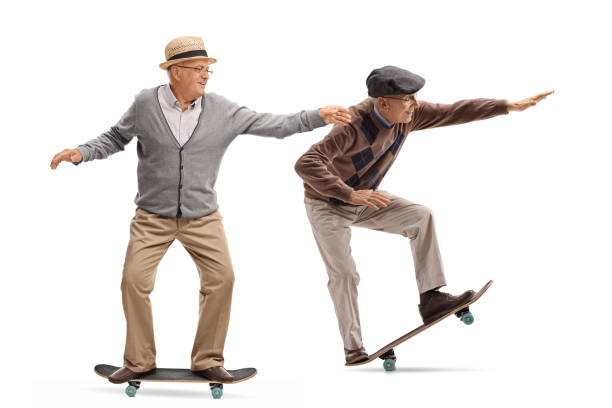 In 2016 people age 65 and over represented 15.2% of the population but that number is expected to grow to 21.7% by 2040. Those 85 and older are projected to more than double (6.4 million in 2016 to 14.6 million in 2040). Many have labeled this trend the “Aging Tsunami” and they speculate about the implications about the need for caregivers and supports needed to care for this great number of old people. Underlying this concern is the widely held belief that aging and senility are synonymous, but that belief is false! Many people can live into old age happy, healthy and mentally alert without the need for caregivers.
In 2016 people age 65 and over represented 15.2% of the population but that number is expected to grow to 21.7% by 2040. Those 85 and older are projected to more than double (6.4 million in 2016 to 14.6 million in 2040). Many have labeled this trend the “Aging Tsunami” and they speculate about the implications about the need for caregivers and supports needed to care for this great number of old people. Underlying this concern is the widely held belief that aging and senility are synonymous, but that belief is false! Many people can live into old age happy, healthy and mentally alert without the need for caregivers.
The habits we have throughout our lifespan will have a cumulative impact on how we age. If you spend your adult years physically unhealthy, mentally disengaged, with poor coping strategies like smoking and drinking, your health, both mental and physical, will likely be compromised when you are a senior. Studies have demonstrated a relationship between the development of cognitive impairment and dementia with lifestyle-related risk factors, such as physical inactivity, tobacco use, unhealthy diets, and harmful use of alcohol. Not surprising, certain chronic medical conditions like hypertension, diabetes, obesity and depression, when not managed properly, are associated with an increased risk of developing dementia.
Here are some less well-known risk factors associated with cognitive decline:
TV viewing: Sitting and watching TV for long periods (especially in the evening) is one of the most dangerous things that older people can do because they are much more susceptible to the damages of physical inactivity and future disability.
Social isolation and loneliness: Being isolated and lonely carries higher risks for a variety of physical and mental conditions (high blood pressure, heart disease, obesity, a weakened immune system, anxiety, depression, cognitive decline, Alzheimer’s disease, and even death).
Exposure to neurotoxins: Consuming foods and drinks that are carcinogenic and/or neurotoxic can impact how our brain ages. Studies found that people who drank diet soda every day tended to have smaller brains and poorer memory, both are risk factors for developing dementia. Researchers have coined the word “gerontogens” to describe the toxins (cigarette smoke, UV rays, aspartame, chemotherapy) that may put people at an increased risk for accelerated aging.
Early retirement: Research has shown that retirement is usually accompanied by a decline in social activities and less interaction with people, both factors in cognitive decline. Those who stay in the work force longer are protecting themselves against premature mental aging.
So, what are the good things we can do to help us stay alert and healthy into old age?
 Social support network: Research consistently demonstrated that having involved family and friends play a direct or indirect role in promoting their health-related behaviors, that led to healthy aging. Those who have social support are more likely to engage in physical fitness, pleasurable activities that decrease stress and have a stronger sense of happiness and purpose than those who are isolated. Multi-generational interaction is also important for older people to be less isolated and feel more needed within their families and community.
Social support network: Research consistently demonstrated that having involved family and friends play a direct or indirect role in promoting their health-related behaviors, that led to healthy aging. Those who have social support are more likely to engage in physical fitness, pleasurable activities that decrease stress and have a stronger sense of happiness and purpose than those who are isolated. Multi-generational interaction is also important for older people to be less isolated and feel more needed within their families and community.
Being physically fit: Exercise helps memory and cognition. Those who exercise regularly report better mood, sleep, and less stress. All of these are protective factors against cognitive decline. Seniors who are physically fit are less likely to have chronic disease (a major risk factor in developing dementia). Physical activities that have a social component, like tennis, golf, and soccer, increase life expectancy by 5 to 10 years!
Healthy stress management: Activities that help manage stress like meditation or yoga, gardening, and bird watching also improve mental and physical health. Birdwatching is one of the most popular and fastest growing hobbies in North America. Being outside in nature is very calming and helps decrease anxiety.
 Cognitive activities such as sudoku, puzzles, and reading: This is not too surprising- using our brain regularly protects it against premature aging. Reading every day may reduce dementia risk, and reduced memory decline by more than 30%. Puzzles like the daily crossword and sudoku will not prevent dementia, but when done throughout adulthood, can help resist, or postpone, cognitive decline.
Cognitive activities such as sudoku, puzzles, and reading: This is not too surprising- using our brain regularly protects it against premature aging. Reading every day may reduce dementia risk, and reduced memory decline by more than 30%. Puzzles like the daily crossword and sudoku will not prevent dementia, but when done throughout adulthood, can help resist, or postpone, cognitive decline.
Eating well: Eating a diet rich in fruits, vegetables, and whole grains that is low in animal products (meat and dairy) lowers the risk of cognitive decline in later life.
Lower Caloric Intake: Evidence suggests that lower caloric intake may be associated with reduced risk of cognitive decline. Studies show that weight loss may be associated with improved cognition as well.
Researchers developed the MIND diet and found that it may reduce the risk of developing Alzheimer’s disease by as much as 53%. The study found that participants whose diets followed the MIND recommendations had a level of cognitive function the equivalent of a person 7.5 years younger.
The 10 foods recommended in the MIND diet: green leafy vegetables, other vegetables, nuts, berries, beans, whole grains, fish, poultry, olive oil and wine.
Having an active sex life: Sex can burn fat, cause the brain to release endorphins, and lead to increase intimacy with your partner. Some studies have found that a satisfying sex life can add years to your life!
 Purpose In Life (PIL): PIL has been associated with positive health outcomes among older adults, including fewer chronic conditions, cognitive impairments, less disability, fewer heart attacks and strokes, and reduced mortality. Though PIL will vary person to person, many older adults feel purposeful when taking care of grandchildren, volunteering or becoming involved in community service work or religion, being accountable to friends, learning new things or attending classes, or even simply having a pet or garden they are responsible for.
Purpose In Life (PIL): PIL has been associated with positive health outcomes among older adults, including fewer chronic conditions, cognitive impairments, less disability, fewer heart attacks and strokes, and reduced mortality. Though PIL will vary person to person, many older adults feel purposeful when taking care of grandchildren, volunteering or becoming involved in community service work or religion, being accountable to friends, learning new things or attending classes, or even simply having a pet or garden they are responsible for.
Aging is no different than most of adulthood; our lifestyle choices weigh heavily on our health outcomes. If you are healthy and active throughout adulthood there is no reason you can’t maintain your health and wellness into old age. Not only can we live longer, but we can live healthy longer, if we do the things needed to promote our mental, physical, and emotional wellness. Theodore Roosevelt said it best, “Old age is like everything else. To make a success of it, you’ve got to start young.”




Join the Conversation